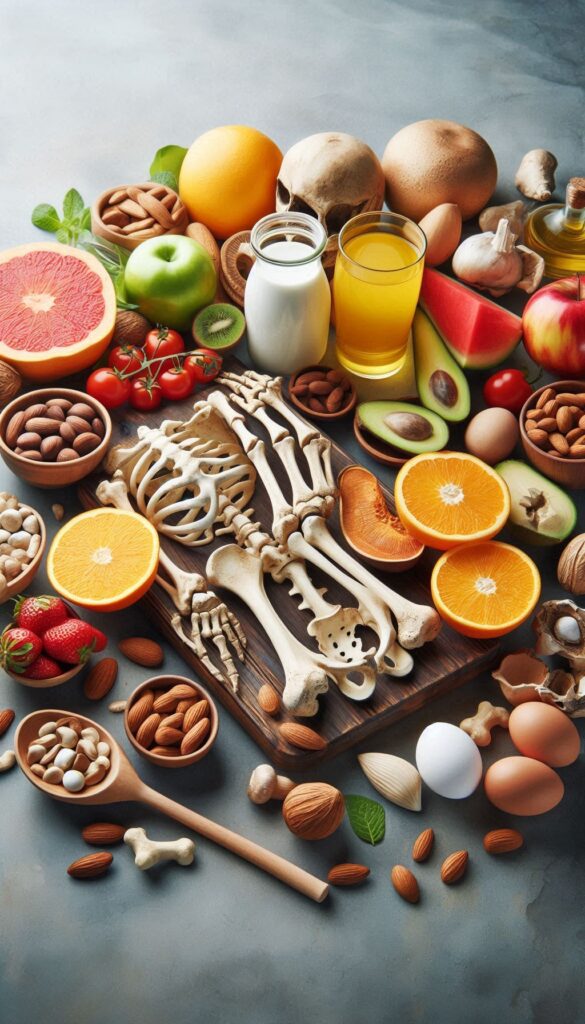Our bones are the framework of our bodies, providing structure and protection while allowing us to move and thrive. To maintain strong, healthy bones throughout life, it’s essential to focus on a diet rich in specific nutrients that support bone health. This comprehensive guide will explore the best foods for strong bones, offering practical tips and delicious recipes to help you incorporate these nutrients into your daily meals. Whether you’re looking to prevent osteoporosis or simply want to enhance your overall bone health, this article is for you.

Understanding Bone Health
Bones are living tissues that constantly undergo remodeling. This process involves the resorption of old bone and the formation of new bone. Proper nutrition plays a crucial role in maintaining bone density and strength. Without adequate intake of certain nutrients, bones can become brittle and more prone to fractures.
Key Nutrients for Bone Health
- Calcium: Essential for bone formation and strength. The majority of the body’s calcium is stored in the bones and teeth.
- Vitamin D: Enhances calcium absorption in the gut and supports bone growth and remodeling.
- Vitamin K: Vital for bone mineralization and helps in the production of proteins that bind calcium to bones.
- Magnesium: Helps convert vitamin D into its active form and contributes to bone structure.
- Phosphorus: Works with calcium to build and maintain healthy bones and teeth.
See price for Oster Air Fryer Oven, 10-in-1 Countertop Toaster, Large Enough for 2 Pizzas, Stainless Steel French Doors, XL Sized https://amzn.to/4bxhPhu
Best Foods for Strong Bones
Leafy greens such as kale, spinach, and collard greens are excellent sources of calcium and vitamin K. They also provide magnesium, which is essential for bone health.
Recipes:
- Kale and Quinoa Salad: Toss chopped kale with cooked quinoa, cherry tomatoes, cucumber, and a lemon-tahini dressing.
- Spinach and Mushroom Frittata: Combine spinach, mushrooms, eggs, and cheese for a nutrient-packed breakfast or brunch option.
2. Dairy Products
Dairy products like milk, cheese, and yogurt are rich in calcium and often fortified with vitamin D. They also provide protein, which is necessary for maintaining bone density.
Recipes:
- Greek Yogurt Parfait: Layer Greek yogurt with fresh berries, honey, and a sprinkle of granola for a satisfying snack.
- Cheese-Stuffed Chicken Breast: Stuff chicken breasts with cheese and bake until cooked through for a delicious main course.
Fatty fish such as salmon, mackerel, and sardines are excellent sources of vitamin D and omega-3 fatty acids, which support bone health and reduce inflammation.
Recipes:
- Baked Salmon with Herbs: Season salmon fillets with herbs and bake until tender. Serve with a side of steamed vegetables.
- Sardine Salad: Combine sardines with mixed greens, avocado, and a squeeze of lemon juice for a quick and nutritious salad.
4. Nuts and Seeds
Nuts and seeds, particularly almonds and chia seeds, are rich in calcium, magnesium, and healthy fats. They also provide protein and fiber.
Recipes:
- Almond Butter Smoothie: Blend almond butter with banana, spinach, and almond milk for a creamy, nutrient-rich smoothie.
- Chia Seed Pudding: Mix chia seeds with almond milk and let sit overnight. Top with fruit and nuts for a tasty dessert.
See price for Cascadian Farm Organic Gluten Free Brownie Crunch Cereal, 12.4 oz. https://amzn.to/3Wc7lQv
5. Fortified Foods
Some foods are fortified with calcium and vitamin D, including certain plant-based milk alternatives and breakfast cereals. These can be beneficial if you have dietary restrictions or prefer non-dairy options.
Recipes:
- Fortified Oatmeal: Prepare oatmeal with fortified almond milk and top with fresh fruit and nuts.
- Fortified Cereal Bowl: Choose a cereal fortified with calcium and vitamin D, and enjoy with a splash of fortified plant-based milk.
6. Eggs
Eggs provide vitamin D and protein, both of which are important for bone health. They also contain small amounts of calcium and phosphorus.
Recipes:
- Egg Muffins: Whisk eggs with vegetables and cheese, pour into muffin tins, and bake for a convenient breakfast option.
- Shakshuka: Cook eggs in a spicy tomato sauce with peppers and onions for a flavorful and satisfying meal.
7. Beans and Lentils
Beans and lentils are good sources of calcium and magnesium. They also offer protein and fiber, making them a great addition to a bone-healthy diet.
Recipes:
- Lentil Soup: Prepare a hearty soup with lentils, carrots, celery, and spices for a comforting meal.
- Black Bean Salad: Mix black beans with corn, tomatoes, avocado, and a lime vinaigrette for a refreshing and nutritious salad.
See price for Magic Bullet Blender, Small, Silver, 11 Piece Set https://amzn.to/3LdNVV1
Tips for Supporting Bone Health Through Diet
**1. Balance Your Diet
Ensure that you are consuming a variety of foods rich in bone-supporting nutrients. A balanced diet will provide all the essential vitamins and minerals necessary for optimal bone health.
**2. Combine Nutrients
Pair calcium-rich foods with sources of vitamin D and magnesium to enhance absorption. For example, add a side of salmon to a leafy green salad for a nutrient-packed meal.
**3. Consider Fortified Foods
If you have dietary restrictions or struggle to get enough calcium and vitamin D, consider incorporating fortified foods into your diet. These can help fill nutritional gaps.
**4. Stay Hydrated
Drink plenty of water to support overall health, including bone health. Proper hydration helps maintain the integrity of the bone matrix.
**5. Engage in Weight-Bearing Exercise
In addition to a healthy diet, regular weight-bearing exercises such as walking, jogging, or resistance training can help maintain bone density and strength.
Conclusion
Maintaining strong bones requires a combination of proper nutrition, regular exercise, and healthy lifestyle choices. By incorporating these bone-healthy foods into your diet, you can support your bone health and overall well-being. Remember to balance your meals, choose nutrient-dense foods, and stay active to keep your bones strong and resilient.
References
- Harvard T.H. Chan School of Public Health. (2023). “Bone Health.” Retrieved from Harvard T.H. Chan
- National Osteoporosis Foundation. (2022). “Bone Health and Osteoporosis: A Review of the Current Research.” Retrieved from NOF
- American Journal of Clinical Nutrition. (2022). “Dietary Factors and Bone Health.” Retrieved from AJCN
- Mayo Clinic. (2022). “Bone Health: The Role of Calcium and Vitamin D.” Retrieved from Mayo Clinic
By following these dietary recommendations and maintaining a healthy lifestyle, you can support your bone health and enjoy a stronger, more resilient skeleton.
